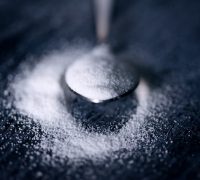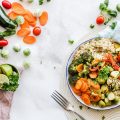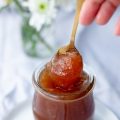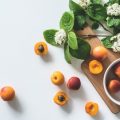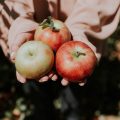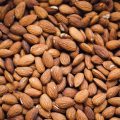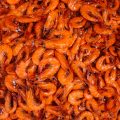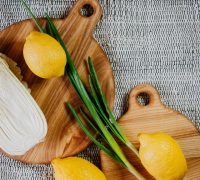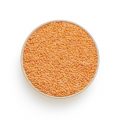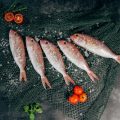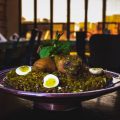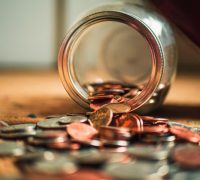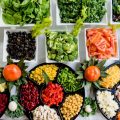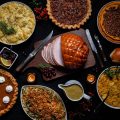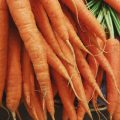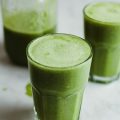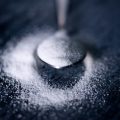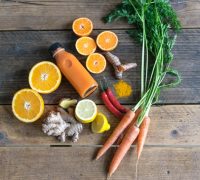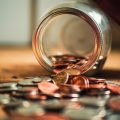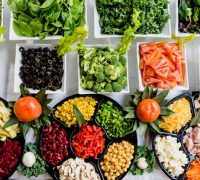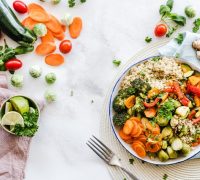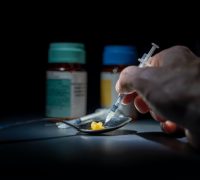I am currently having trouble with joint inflammations again, and as always when I have tried something for a while and then notice that it does not work too well, I get into researching. So it was time for that again.
My (scientifically working) mind tells me that there might be something I have changed lately that now makes the difference compared to before. “Before” was the phase when I ate strictly Paleo for a couple of months in summer and autumn last year and was basically free of complaints. A little later, I have started to experiment around with different kinds of foods to see whether they work for me, which led to ditching some and keeping some. But now the inflammations are back, and there are basically just two things I can blame this on this time: coffee and dairy.
Coffee has always been a weakness of mine. I rarely drink it black (then I have enough after half a cup), but put into it (any kind …), and I can drink mug after mug. And I know coffee is bad for me. But I wanted to know if the dairy was, too. And we do not speak about regular milk here (which I already know is bad for me), but about cream which is quite low in lactose and casein. Well, if you end up drinking up to a whole 200 ml pot (about 3/4 cup) of cream (which I blend with water because pure it is too much for me) with your coffee throughout the day, every day, for several weeks, you can imagine that it does pile up.
I started googling around and stumbled upon an article about dairy casein and leg pain. I got curious because this is exactly what I had as a child! The leg pain actually is an allergic reaction to dairy casein: The body identifies the casein proteins as dangerous substances and responds with an immune reaction which leads to antibody creation, as well as histamine production in the mast cells. Although histamine prevents infections, it can cause irritation and inflammation (and thus pain) in soft tissues and joints. I also learned it is a common practice that lab animals receive casein injections to induce inflammation in them for further study purposes.
~ better not eat the whole thing, little mouse! ~
I had always thought about my food sensitivities as intolerances (due to enzyme deficiency) but never as allergies because the concept of allergy is tied to skin rashes, hayfever, and anaphylactic shock in my mind (all those are things I never experienced myself). I also thought that allergy symptoms would occur immediately after the exposition to the allergenic substance.
But an allergy is basically any kind of hypersensivity disorder of the immune system to actually harmless substances in the environment, and an allergic reaction can occur with a latency of up to 24 hours. (I really should have read the English Wikipedia article much earlier because it is so much more informative than the German one which just explains the immune-biological reactions on the levels of cell and molecular biology without tying those to specific allergens, like proteins in certain foods).
What follows now is a retrospect of my life with a focus on health issues. It is a history of inflammation and chronic pain. If you want to read it, use the chance to get a cup of tea now because it is quite the story.
~ did you get something like this? ~
When I think back, my troubles started when I was about 8 or 9 years old. Around that time, I developed such severe pain in my knee joints that I could barely walk stairs or ride a bike. After a few years of effectless physiotherapy and ultrasonic treatments, my parents took me to an Ayurvedic doctor who did pulse diagnosis with me and said, “no yoghurt, no curd, no cheese, no chocolate, no icecream”. However, he just named the foods I was eating then that caused the pain (I did not drink milk because I did not like it), but he did not say anything about the underlying cause. I followed the advice and was completely pain-free a few weeks later. I also noticed that the pain came back when I cheated (which I did because I loved yoghurt so much – I had almost entirely lived on yoghurt before, so giving up yoghurt was the hardest thing for me). But in the end, having no pain was the better option.
While I was dairy-free then, I still ate glutinous grains – bread, pasta, cake – and got inflammations around my toe nails when I was 12. Again, it was very bad. My toes were swollen and purple and finally burst open so I could not wear shoes anymore, just sandals. I had those open toes for about two years and ended up with surgery four times.
~ even today, my toes are still a mess ~
In the years afterwards, I started to restrict my eating and basically ate just apples and vegetable soups. Ironically, this was better allergy-wise because I was still dairy-free and also limited grains, but my immune system was so weakened due to the constant undereating that I suffered from chronic sinus infections and headaches.
After finishing secondary school (which you do at about 19 here), I moved out and started cultural studies in Lüneburg, a small northern-German town near Hamburg.
~ my home during the first years of studies ~
I lived in a flat-sharing community during the first two years. My roommates were very fond of coffee which I never used to drink before (I grew up with tea), and I learned that I really like it when I put milk into it. Milk was not on my avoid-list, remember?
Result #1 was that I had terrible abdominal pain from then on. I often was so bloated that I could barely eat. By then, my diet was incredibly bad anyway, I was not used to cooking for myself, so my staple foods were apples, dry bread rolls, candy, and coffee with milk. I ate like that for several years. (This is the diet that completely ruined my blood sugar levels which are already instable by disposition.) After some time, I thought I might be lactose-intolerant and switched to lactose-free milk, and the bloating got better. But while this helped me with my troubled gut, it disguised the fact that actually casein was the real problem: Lactose intolerance is painful but harmless, while casein allergy is less painful at first, but dangerous in the long run. Anyways, I went on with dairy and even tried yoghurt again because I thought that, as long as I bought the lactose-free kind, it was perfectly alright.
Of course, it was not. About 1 1/2 years later, I faced result #2 which was an inflammation of my left submandibular gland. Particularly, I had a stone in my salivary gland that clogged the salivary duct and made the gland swell to the size of an egg after eating or drinking anything but pure water, and it stayed like that for several hours. It was so incredibly painful that I did not know what to do. I thought I would lose my mind, and sometimes I just wanted to tear the whole thing out of my throat with my bare hands. This pain accompanied me 24 hours a day and seven days a week for the next 1 1/2 years. (Now I know that I am not suicidal.) My throat was so swollen on the inside as well that I had choking fits regularly after eating, and I dropped a dangerous amount of weight, on top of what I had already lost, and was so weakened overall that I was not able to study properly anymore. After having taken every kind of antibiotics under the sun, and eventually receiving injections of antibiotics through my throat directly into the gland (it hurt!) for several months without any improvement, I got surgery. The doctors cut the salivary duct from within my mouth, but when I woke up after the surgery, the stone was still there because the whole gland was so inflamed meanwhile that it needed to be taken out completely. This occurred half a year later, and since then I have a beautiful 8 cm scar across my throat and one salivary gland less.
~ this is a picture of me from 2005 when the scar was still fresh ~
Because the surgery was so complicated due to the size of my swollen salivary gland, the doctors needed to cut around for 3 hours, and during that time, my head had to be fixed in a skewed position, so I woke up with a crooked cervical spine. I went to an orthopedist a few weeks later, but he reset it so badly that I was not able to get up for a few weeks and needed to put my head down every two hours to relieve my cervical spine for some more months. Also, all my throat lymphaticals had been cut through, and I looked like a pumpkin head from the water retention in my face (which was what I suffered from the most – yes, I am a little vain). This needed several years to finally get better and is the reason why there are so few pictures of me. The fact that I went on consuming dairy and wheat did not help because those foods tend to worsen the swellings.
~ one of the very rare pumpkin-face pictures (from 2007) ~
But the story still goes on a little. The day after I woke up from the surgery, I suddenly had a piercing, sharp pain in my right elbow joint. It went away when I moved the arm a little, but it came back after a while. Within a few weeks, I realized that I could not bend and unbend my arm as I was used to, so I saw a doctor again. (I was gradually getting annoyed because I had been seeing doctors and getting treatments several times a week in the years before.) The doctor diagnosed a tennis elbow (which was wrong – it was a joint inflammation) and prescribed physiotherapy which I obediently did for some months. The result was that the pain got worse and worse, and the flexibility of my elbow got less and less. In the end, the angle in which I could move my arm had reduced from 180° to about 30°. I saw a different doctor who x-rayed me and told me that my elbow joint was inflamed and stuffed with free bodies which had to be removed by surgery. These could not be detected at first because they consist of cartilage which does not show up in the x-ray so well, and a few months before I had had just a single one. Now there were more – in fact, the doctor got 14 (!) free bodies out of my elbow joint. They looked like popcorn – no wonder I almost could not move my arm anymore!
The ugly consequence of having those free bodies in my joint for so long and getting physiotherapy was that about half of my joint cartilage got shredded. This is irreversible and led to follow-up inflammations every few weeks in the years afterwards. The doctor who had done the surgery told me that I was going to face a gradual deterioration and ultimately offered to cut my sinews and thus fix the joint in an angle of my desire. I refused and swallowed painkillers instead. By that time, I was already living and studying psychology in Heidelberg, and this condition has accompanied me during my first semesters of studies here.
And then a miracle happened: I started to play the piano, and was pain-free almost immediately. I believe what piano playing does is to provide a very tender form of muscle training and thus stabilizing the joint, and I also believe that there is some flow of energy going on.
But I still did not change my diet. Instead, I put myself on a “healthy-eating” plan: regular meals, increased food intake, and of course lots of whole grain bread, oatmeal, and (lactose-free) dairy. Within a week, I had developed such terrible shortness of breath and was so fatigued that I almost could not walk anymore, and just dragged myself around. Every movement was incredibly straining. I ended up seeing a cardiologist who assessed that my heart was perfectly alright, and although he was worried because I had fallen from the stationary bike after half a minute when he took an exercise ECG, he had no idea what might be wrong with me. He prescribed me thyroid hormones which did not really help.
I assumed the breathing problems were due to stress with my eating plans – now I think it may have been an allergic reaction that showed up as asthma – so I threw all those plans away (the big amounts of whole grains included) and went back to my low-caloric, rather chaotic eating patterns. I felt better immediately, but was still unwell overall with chronic infections and sinus inflammations. In combination with general life stress, my undereating resulted in me being sick all the time, and my exhaustion reached a peek at the end of 2009, when I was getting migraines twice a week and knew I was about to develop a state of serious burnout.
This was when I pulled the brake. I started therapy to learn how to deal with stress and my performance issues, and I also decided to finally get my eating right. Due to a happy coincidence, I moved into an apartment in the courtyard where I still live, and a former neighbor who was making his PhD in clinical psychology then and also was a triathlete with a serious interest in nutrition to improve his athletic performance, told me about low-carb diets and what they can do for your health. He had a lot of books, one of them being “The Paleo Diet” by Loren Cordain which I immediately ordered and devoured. At first, though, I tried low-carb eating in the way my neighbor had told me: with lots of high-fat dairy as well. So I ate curd for breakfast the next day, and although it filled me well, my sinuses exploded overnight. I could bear it for two more days, then I threw the dairy out of the window and started the Paleo diet in summer 2010, focusing on vegetables, meat and seafood, and some nuts and fruit.
~ roasted chicken and kabocha squash, fresh parsley, and almond butter ~
And for the first time in my life, I felt good with what I ate. I still needed some fine-tuning because I realized the whole very low-carb thing made me feel sluggish, so I focused on root vegetables, winter squash, and onions (which are higher in carbs) next to greens, and this worked well. But I missed my tea with milk, the one thing I consider my perfect soul food because it makes me feel so calm after drinking it (before the unhappy effects from the milk occur, that is). By that time, I had already discovered almond milk and made it at home regularly, but I found it rather laborous and had not optimized my filter technique yet, so my almond milk was rather lumpy. (For those of you who make their own nut milk: Use nylon socks for filtering! You can get those at every department store, they are reusable if you rinse them afterwards, and they cost much less than sprout bags.)
So, after eating strictly Paleo for some weeks and being free of complaints, I started to experiment. (You can read about my experiments here.) I reintroduced the foods I had cut out, one at a time. I tried milk. And then soy milk. (I also tried different kinds of grains and some other things.) I just wanted to find a milk substitute that was easy and worked well. Unnecessary to say that these experiments can be best described as kissing a lot of frogs.
Without being overly aware of it, what I did was scientific research on myself. I first ate an elimination diet for several weeks, and then tested one probably causative factor at a time. This way, I learned what worked and what did not, and I also carefully noticed the unhappy effects I experienced afterwards. Many of them were of the inflammatory kind – throat and facial swellings, stuffed sinuses, and painful swellings within my skin tissue, preferably in my face. (I just had one again at the right side of my nose the other week, and half of my nose looked like a potato.)
The foods that reliably elicited those effects within a day are dairy casein, soy protein, and gluten. So, I have come to think that I am actually allergic to those foods. Other foods, like lactose, just cause normal intolerance reactions – gut pain and bloating – but no inflammatory reactions. In this latter group are unfortunately also (gluten-free) whole grains and legumes that are just hard on my tummy if I eat them in larger than tiniest amounts. So, my body does not seem to be adapted to modern foods at all.
Whee, I really think I have figured it out now! And for me, this means that I am going back to the cave now, and this time I am going to stay there.
~ ugh! ~
Does this make sense to you? Do you suffer from food allergies or intolerances? If yes, how did you learn about it, and which symptoms did you experience?

